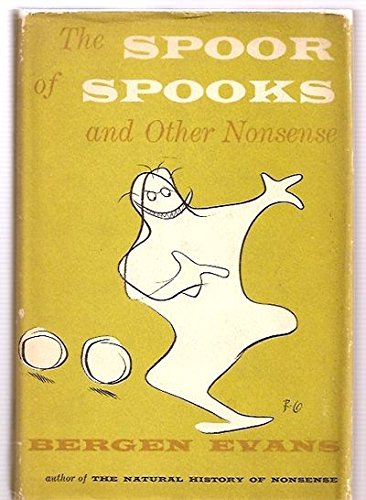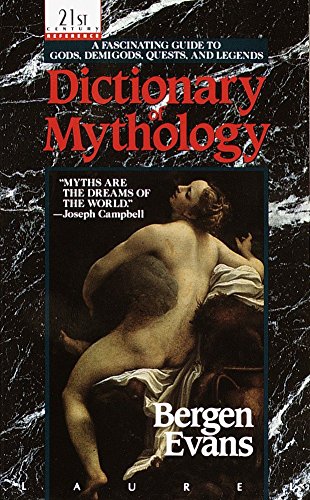Background
He was born in Franklin, Ohio, one of six children of Rice Evans and Louise Cass. His father, a country doctor, gave up his practice and entered the consular service. The family moved to Sheffield, England, when Bergen was four.


(First edition bound in green cloth. A VG+ with a faint wa...)
First edition bound in green cloth. A VG+ with a faint water spot to the bottom edge of the boards else fine in VG dj.
https://www.amazon.com/spoor-spooks-other-nonsense/dp/B0007DE8SA?SubscriptionId=AKIAJRRWTH346WSPOAFQ&tag=prabook-20&linkCode=sp1&camp=2025&creative=165953&creativeASIN=B0007DE8SA

(The decorative dustjacket adds much to this vintage hardc...)
The decorative dustjacket adds much to this vintage hardcover. (Don' t buy this one without the jacket) The dustjacket does show some wear along the edges from shelving. Book is clean and bright inside, VG+./lh
https://www.amazon.com/Comfortable-words-Bergen-Evans/dp/B0007DKSKM?SubscriptionId=AKIAJRRWTH346WSPOAFQ&tag=prabook-20&linkCode=sp1&camp=2025&creative=165953&creativeASIN=B0007DKSKM

(From the ancient past come the myths that color our prese...)
From the ancient past come the myths that color our present. Like the symbols that haunt our dreams and guide our inner journeys, the myths of the Western world touch something deep within us, awakening old nightmares and new yearnings. Some of the gods, tales, and mythic creatures in Bergen Evan's Dictionary Of Mythology are as familiar as the disturbing tale of Oedipus. Others may seem strange, wonderful, or chillingly macabre: Lycaon, the murderer, who is transformed into a wolf by an angry god; Cronus (Time) who devours his won children; Pan, the god of the animal in man, who fills us with overmastering fears that sweep courage and prudence aside; the hero Sigurd, who seeks a magic ring and finds a maiden . . . in a ring of fire. These tantalizing stories and dozens more make this book a perfect addition to any library, as delightful for browsing as it is essential for reference.
https://www.amazon.com/Dictionary-Mythology-Fascinating-Demigods-Legends/dp/0440208483?SubscriptionId=AKIAJRRWTH346WSPOAFQ&tag=prabook-20&linkCode=sp1&camp=2025&creative=165953&creativeASIN=0440208483
professor television personality athor
He was born in Franklin, Ohio, one of six children of Rice Evans and Louise Cass. His father, a country doctor, gave up his practice and entered the consular service. The family moved to Sheffield, England, when Bergen was four.
He returned to Ohio during World War I, attending high school in Franklin and working in a paper mill.
He entered Miami University at Oxford, Ohio, at the age of fifteen, where he worked on campus as a waiter and drew newspaper cartoons.
Evans graduated with a B. A. in 1924 and was a member of Phi Beta Kappa; he went on to obtain an M. A. from Harvard University (1925), became a Rhodes Scholar at Oxford University (1928 - 1931), and then returned to Harvard to receive the Ph. D. in 1932.
In 1932, Evans joined the faculty of Northwestern University as a lecturer, and he became a professor thirteen years later. His writing career focused on the English language and its usage.
In his book Comfortable Words (1962), Evans investigated the meaning of words and how meanings change with time. He pulled his topics from everyday life, from experiences with people from all walks of life.
He entered the lecture circuit with a piece entitled "Why Do People Tell Such Awful Lies?" Many were angered by his material but his popularity continued to grow. His book The Natural History of Nonsense (1946) reveals these feelings toward life and people.
One of the last successful network programs from Chicago was the low-key game show, Du Mont's "Down You Go" (1951 - 1956), which introduced the erudite Northwestern University professor, Bergen Evans.
The show was created by Louis G. Cowan, who had a long history of successful game shows on radio and TV, including "Stop the Music. " "Down You Go" was distinctively different from other network productions because of its Chicago base and its use of unknown talent. It emerged as one of the wittiest game shows on TV. "Down You Go" had a very simple format. Evans gave clues to the panel, which was supposed to guess a slogan, sentence, word, or phrase by adding a letter at a time. Members of the panel included Francis Coughlin, Toni Gilman, Robert Breen, and Carmelita Pope.
Evans soon was making several times more money from broadcasting than from teaching.
In early 1955, Evans became the head of a staff of ten that prepared questions for "The $64, 000 Question" and "The $64, 000 Challenge. " Contestants appeared over a period of several weeks in an effort to reach the $64, 000 level.
The television shows became known for their tough questions.
A scandal erupted with charges that some contestants had been given answers in advance, but Evans's career and reputation remained untainted when he proved he knew nothing of the corruption on the shows.
A later Evans show, "The Last Word" (1957 - 1959), which was also created by Cowan, dealt with etymologies. Evans conducted sophisticated panel discussions on the vagaries of the English language with Arthur Knight, June Havoc, and John Mason Brown. Evans was master of ceremonies on other network TV and radio shows, including "Super Ghost" (1952 - 1953), "Of Many Things" (1953 - 1954), "English for Americans" (1961 - 1962), "Inquiry" (1961 - 1963), and "Words in the News" (1962 - 1963).
Throughout his television and radio career, Evans remained on the faculty at Northwestern, where for more than forty years he taught a course called "Introductions to Literature. "
He was so well liked and respected that his colleagues voted unanimously to let him continue to teach past retirement age as professor emeritus of English.
On campus, Evans had a reputation for being unconventional. He created a mild stir when he took the black American diplomat Ralph Bunche to the Northwestern Faculty Club long before the days of civil rights protests.
Once, a minister called him to task for one of his ongoing attacks on the alleged infallibility of the Bible. Evans asked the minister to return for his next lecture. When the minister showed up with seventy fellow clergy, Evans changed his original prepared talk and spoke instead on the intimidation of the public by the clergy.
Evans died in Highland Park, Illinois.
Evans's A Dictionary of Contemporary American Usage (1957), cowritten with his sister Cornelia, produced an apparent spin-off: the television show The Last Word, which he hosted Sundays on CBS, from 1957 to 1959.
Viewers were encouraged to send in questions that pertain to spelling, punctuation, usage and pronunciation. These questions were put to a panel of experts from various professional fields. Sound recordings of broadcasts for May 18 and May 25, 1957, are archived with the Library of Congress.
(The decorative dustjacket adds much to this vintage hardc...)
(From the ancient past come the myths that color our prese...)
(First edition bound in green cloth. A VG+ with a faint wa...)
(Excellent Book)
Evans came to believe that most people were liars.
Quotations: "I never cease to marvel, " he commented, "that I am paid money for this at all. "
He became best known for his tremendous wit.
He married Jean Whinery on August 5, 1939. They had two children.
mother
Louise Cass
